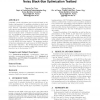Free Online Productivity Tools
i2Speak
i2Symbol
i2OCR
iTex2Img
iWeb2Print
iWeb2Shot
i2Type
iPdf2Split
iPdf2Merge
i2Bopomofo
i2Arabic
i2Style
i2Image
i2PDF
iLatex2Rtf
Sci2ools
103
click to vote
GECCO
2010
Springer
2010
Springer
Benchmarking real-coded genetic algorithm on noisy black-box optimization testbed
Originally, genetic algorithms were developed based on the binary representation of candidate solutions in which each conjectured solution is a fixed-length string of binary numbers; however, real-valued representation scheme is basically superior and frequently utilized in addressing hard optimization tasks, particularly for the optimization in continuous domains under a black-box scenario. In this paper, we implement a generational real-coded genetic algorithm (RCGA)—which is composed of tournament selection, arithmetical crossover, and adaptive-range mutation—with a multiple independent restarts mechanism and benchmark it on the BBOB-2010 noisy testbed. The maximum number of function evaluations for each run is set to 50000 times the search space dimension. For 40-dimensional search space, the algorithm shows promising results with 6 functions being solved up to the precision of 10−8 . Categories and Subject Descriptors
| Added | 30 Aug 2010 |
| Updated | 30 Aug 2010 |
| Type | Conference |
| Year | 2010 |
| Where | GECCO |
| Authors | Thanh-Do Tran, Gang-Gyoo Jin |
Comments (0)

